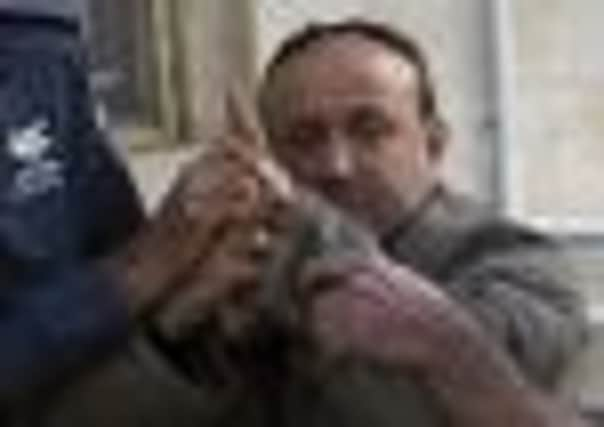Solitary for jailed Palestinian


Marwan Barghouthi, an architect of the second intifada that broke out in 2000, appeared to be advocating a third uprising – though a less violent one, based on popular protests rather than suicide bombings, in a letter to supporters from his cell in Hadarim Prison to mark the tenth anniversary of his arrest last week. He is serving five life terms plus 40 years after being convicted in 2004 of attacks that left four Israelis and a Greek monk dead.
Sivan Weitzman, spokeswoman for the Israel Prison Authority, said Barghouthi had been placed in isolation and would be denied visits for a week for the issuing of the statement.
Advertisement
Hide AdAdvertisement
Hide AdBarghouthi’s years in prison have boosted his nationalist credentials and his letter was in keeping with his efforts to project himself as a leader of all Palestinians, not just of the Fatah movement headed by Palestinian Authority president Mahmoud Abbas.
“The launch of large-scale popular resistance at this stage serves the cause of our people,” he wrote. He said the prospect of ending Israeli occupation through negotiations is “an illusion”. Analysts said it was the first time that Barghouthi, who was a strong supporter of the 1993 self-rule agreement with Israel, had flatly ruled out negotiations from being at least a part of the Palestinian strategy.
In his letter, he said talks were futile because of Israel’s continued expansion of settlements in the West Bank, an area Palestinians claim as the heartland of their future state.
He added: “It must be understood there is no partner for peace in Israel when the settlements have doubled. It is the Palestinian people’s right to oppose the occupation by all means.”
The jailed leader also called on the Palestinian Authority to halt its security co-operation with Israel, which the latter views as pivotal in thwarting terrorist attacks but which Barghouthi said protects the occupation.
Barghouthi’s associates say that by “popular resistance” he means unarmed demonstrations along the lines of those Palestinians have held against Israel’s separation barrier and settlement expansion.
However, analysts believe that in the immediate term large scale protests are unlikely to materialise. Last Friday’s protests against Israeli land policies saw turnout fall well short of what organisers had hoped.
Barghouthi enjoyed good relations with many Israeli leaders during the years before the second intifada and the Israeli left hopes that, if released, he could help broker a two-state compromise peace solution. But he was not included in the October prisoner exchange that freed 1,027 Palestinians in exchange for Sergeant Gilead Schalit, who was being held by Hamas.
Advertisement
Hide AdAdvertisement
Hide AdYossi Sarid, former leader of the dovish Meretz party, said yesterday: “The best thing to do is to release him as soon as possible to strengthen the moderate camp on the Palestinian side. But the government does not want a partner and does not intend to negotiate, so from their point of view Marwan Barghouthi is not a good investment.”
Israeli officials say they are willing to launch unconditional peace talks with Mr Abbas, but reject his demand that they first freeze all settlement activity.